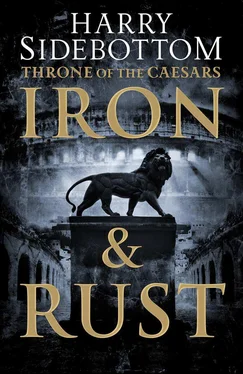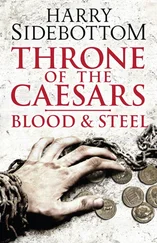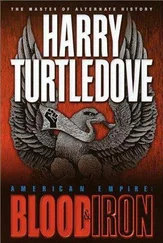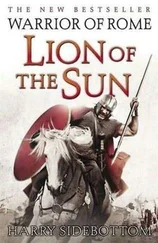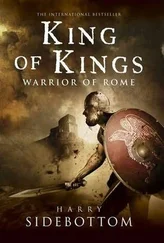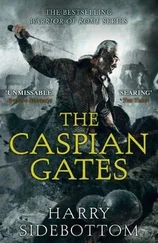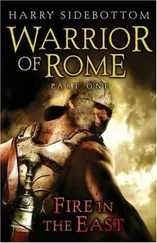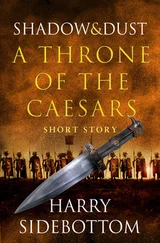Harry Sidebottom - Iron and Rust
Здесь есть возможность читать онлайн «Harry Sidebottom - Iron and Rust» — ознакомительный отрывок электронной книги совершенно бесплатно, а после прочтения отрывка купить полную версию. В некоторых случаях можно слушать аудио, скачать через торрент в формате fb2 и присутствует краткое содержание. Год выпуска: 2014, Издательство: HarperCollins Publishers, Жанр: Исторические приключения, на английском языке. Описание произведения, (предисловие) а так же отзывы посетителей доступны на портале библиотеки ЛибКат.
- Название:Iron and Rust
- Автор:
- Издательство:HarperCollins Publishers
- Жанр:
- Год:2014
- ISBN:нет данных
- Рейтинг книги:4 / 5. Голосов: 1
-
Избранное:Добавить в избранное
- Отзывы:
-
Ваша оценка:
- 80
- 1
- 2
- 3
- 4
- 5
Iron and Rust: краткое содержание, описание и аннотация
Предлагаем к чтению аннотацию, описание, краткое содержание или предисловие (зависит от того, что написал сам автор книги «Iron and Rust»). Если вы не нашли необходимую информацию о книге — напишите в комментариях, мы постараемся отыскать её.
Iron and Rust — читать онлайн ознакомительный отрывок
Ниже представлен текст книги, разбитый по страницам. Система сохранения места последней прочитанной страницы, позволяет с удобством читать онлайн бесплатно книгу «Iron and Rust», без необходимости каждый раз заново искать на чём Вы остановились. Поставьте закладку, и сможете в любой момент перейти на страницу, на которой закончили чтение.
Интервал:
Закладка:
Every morning the baggage had left several hours before Iunia Fadilla had risen. It spared her the noise and dust, and ensured that her lodgings — a sumptuous pavilion where no imperial post house was convenient — were suitably prepared for the night. Her own progress had been slow. As well as the driver, a man walked in front leading the horses. Although not garrulous, Eunomia adhered to one traditional trait of her calling. At every wayside shrine, the old woman insisted on being helped down. Between Rome and the Alps, there was not a humble altar at which she had not offered a libation and mumbled a prayer, not one of Mercury’s cairns to which she had not added a stone.
Late one afternoon, somewhere in the damp marshlands at the head of the Adriatic, the carriage had broken a wheel. A trooper had been sent galloping off to bring aid. It had not arrived by nightfall. There was a small inn about a mile back up the road. The Hind was not reserved for those on official business, and did not have to adhere to the standards of the cursus publicus . The tribune and his men had summarily evicted its guests. Suitably roused, the patron, his wife, two slatternly-looking girls and a potboy busied themselves with brushes and dusters. They had prepared a meal of mutton, bread and olives. It was disgusting. The meat was tough, and there was grit in the bread. The wine was sour. Iunia Fadilla exhibited all the graciousness of good breeding. She insisted the other wayfarers have her leftovers and be allowed to sleep in the stables. She had studied them as they were ushered in to thank her: a family on the edge of destitution, a soldier on his way back from leave, two rough-looking travellers in riding clothes. All the men were hard-eyed, the mother and her young daughter wary, if not frightened. Iunia Fadilla had thought how hard it must be to travel alone, near impossible for a woman.
The carriage ground to a near-standstill. Pulling back the curtain, she looked out. Another sharp corner, more trees, another dismal slope. The sun was out. It barely penetrated the timber. It was the ides of June, the festival of Minerva. If she had still been in Rome, she would have been watching the flute players wandering through the whole city in their masks and long gowns. Men with rods would rush after them, playfully threatening them if they did not fill the streets with music.
Four of the cavalrymen dismounted to help brake the carriage as it descended a steep incline. Iunia Fadilla let the hangings fall shut.
The third day after the ides of June, the Virgins would sweep out the temple of Vesta and throw the dirt in the Tiber. For the first time in the year, the wife of the Flamen Dialis would comb her hair, cut her nails and let her husband touch her. And as the river carried the filth to the sea, and the high priest of Jupiter enjoyed his conjugal rights, men and women might marry without fear of ill luck.
She had feared something worse when Vitalianus, the new deputy Praetorian Prefect, had come to her door. She had thought of the poor Syrian girl Theoclia. When she had not expressed joy at the news, he had smiled patronizingly, and said it was no wonder: any girl would be overwhelmed by the magnitude of her good fortune.
The next day, she had signed the agreement before witnesses. As custom required, her guardian was there. Poor Lucius had appeared as uncertain as she had felt. Her cousin had looked a great deal worse a few days later when he had to set off before her to the North. Like her father, and in later life her first husband, he had no taste for politics.
After the signing, Vitalianus had placed the circle of iron set in gold on the third finger of her left hand. The one connected to the heart, he had said unctuously. With some incongruity, his Praetorians had brought in the betrothal gifts. A necklace of nine pearls, a net-work cap with eleven emeralds, a bracelet with a row of four sapphires, gowns with gold thread — one after another the costly but unwanted items had accrued. The party that evening had been a strained affair. Perpetua had snivelled throughout, and Ticida had recited bad poetry and looked as if he wanted to kill himself. All sorts of other people had thronged to the Carinae to invade her house. The pompous Prefect of the City, Pupienus, both Consuls and her repellent neighbour Balbinus were among those offering congratulations. Another neighbour, Gordian’s sanctimonious old bitch of a sister, Maecia Faustina, had the temerity to give her a lecture on how she should behave now she was betrothed to Maximus Caesar.
She was going to marry the heir to the throne. One day, she would be Empress. She did not want to be Empress. Mamaea had wanted to be Empress, and Mamaea had been hacked to pieces. Sulpicia Memmia had been Empress, and divorce had not saved her. Iunia Fadilla did not want to become a living icon, weighed down with brocade and gems, in endless court ceremonials. She did not want to become an imperial broodmare, the timing of her menses the subject of speculation: Was she pregnant? Would it be a boy, an heir born in the purple? Above all, she did not want men with swords coming for her in some revolt against her father-in-law or husband.
The carriage lurched. It jarred her back and neck. Europa, carried off on the broad back of a bull, had travelled in greater comfort, and her abductor had been a god, not a mortal. Iunia Fadilla wanted to be in her house in the Carinae. Would she ever see her new house on the Bay of Naples again?
She controlled herself. There was no point in railing against fortune. What was it Gordian used to say? The sole aim of life is pleasure, and the first step on the road is the avoidance of pain. Right actions and right thoughts bring pleasure.
Maximus was young. He was said to be good-looking and cultured. The famous sophist Aspines of Gadara constantly attended him. Maximus wrote verse. It could not be worse than that of Ticida. There were many rumours of affairs with women and girls; matrons and virgins from respectable families. At least her husband would not desert her for the beds of his pages, as Hadrian had Sabina. There was something disgusting about the young boys kept by men of that sort, men like Balbinus. Running about the house naked except for some jewels, when they had to venture outside they went veiled, not for modesty like Greek women, but to protect their delicate complexions.
She did not want to marry anyone — not now. When Nummius had died, if he had asked, she would have married young Gordian. If he had asked, she would have been spared this journey, this marriage, a life of restrictions at court. She checked herself. It was neither her beauty nor her wit that had caused this betrothal. She was the great-granddaughter of Marcus Aurelius. It was a dynastic arrangement. An Emperor could do as he pleased. Nero had wanted to marry Poppaea, so he had told Otho to divorce her. She was the great-granddaughter of Marcus Aurelius. She would never be safe.
The carriage was wrenched to a sudden halt. Those troopers still mounted clattered up alongside. Iunia Fadilla opened the curtain.
There was a hairpin bend a few paces ahead at the bottom of the slope. A dozen or more horsemen sat waiting there. They wore hooded cloaks and carried weapons.
The soldiers closed up around her carriage.
‘Clear the road in the name of the Emperor.’ The voice of the tribune betrayed his anxiety. The mountains were full of men denied fire and water.
Iunia Fadilla thought of Perpetua’s fantasies of bandits and rape. These men might be worse. All Emperors have enemies.
One of the horsemen rode forward. From under his hood, he took in the soldiers.
‘Stand aside!’
Ignoring the tribune, the horseman pushed his cloak off his head. He looked straight at her.
Читать дальшеИнтервал:
Закладка:
Похожие книги на «Iron and Rust»
Представляем Вашему вниманию похожие книги на «Iron and Rust» списком для выбора. Мы отобрали схожую по названию и смыслу литературу в надежде предоставить читателям больше вариантов отыскать новые, интересные, ещё непрочитанные произведения.
Обсуждение, отзывы о книге «Iron and Rust» и просто собственные мнения читателей. Оставьте ваши комментарии, напишите, что Вы думаете о произведении, его смысле или главных героях. Укажите что конкретно понравилось, а что нет, и почему Вы так считаете.
